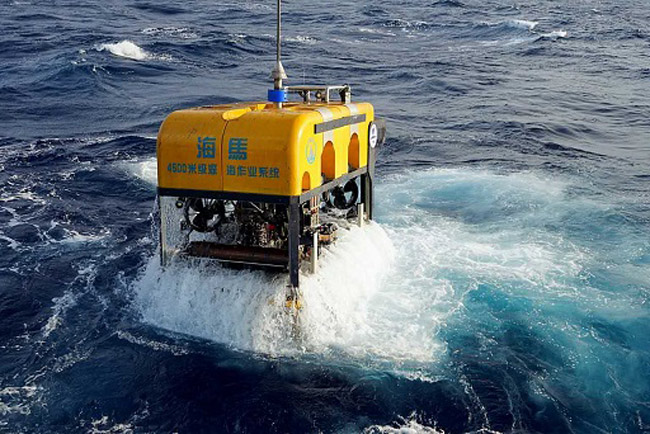

 |
| (The unmanned remotely operated vehicle “Haima." Photo by: Guangzhou Daily) |
China has unveiled its latest discovery of a cold spring in the South China Sea, gesturing a major step forward in flammable ice exploitation in the region.
The cold spring, coded as Haima or sea horse, is located in the southern waters of the Pearl River basin. Covering an area of 618 square kilometers, it is about 1,350 to 1,430 meters’ deep and various kinds of cold spring activities could be detected throughout 350 square kilometers of the total area, according to the preliminary discovery results made public on Saturday in Guangzhou city of southern China’s Guangdong province, the Guangzhou Daily reported.
The China Geology Survey (CGS) under the Ministry of Land and Resources said it began to detect cold springs on the northern continental slope of the South China Sea in 1999. The Haima cold spring was detected in March 2015 by the unmanned remotely operated vehicle “Haima” during its first mission conducting an oceanic geological survey.
According to the CGS, the Haima cold spring is full of natural gas hydrates on the shallow strata. There are also many authigenic carbonates exposed on its surface due to large quantities of methane gas leakage. Different kinds of organism groups co-exist in the cold spring, especially sea mussels which grow on the carbonates.
Methane gas could be detected at the cold springs, which suggests possible storage of natural gas hydrates, including flammable ice, the Guangzhou Daily reported.
The Haima cold spring discovery has proved the rich storage of natural gas hydrates within China’s territorial waters, the newspaper noted, adding that an engineering technological center has been launched in Guangzhou, aiming to further promote China’s detection and exploitation abilities of natural gas hydrates in China’s sea area.
 |
| (Sea mussels found at the cold spring. Photo: Guangzhou Daily) |
 Five made-in-China hi-tech breakthroughs
Five made-in-China hi-tech breakthroughs Beijing Style: Hot pants
Beijing Style: Hot pants HK-Zhuhai-Macao Bridge to open to traffic
HK-Zhuhai-Macao Bridge to open to traffic China opens its first combined transport service to Nepal
China opens its first combined transport service to Nepal Students take stylish bikini graduations photos
Students take stylish bikini graduations photos Charming dancing students pose for graduation photos
Charming dancing students pose for graduation photos Guizhou, Yunnan section of Shanghai-Kunming railway connected
Guizhou, Yunnan section of Shanghai-Kunming railway connected Naked models transformed into landscapes, birds and even DRAGONS by body painting artist
Naked models transformed into landscapes, birds and even DRAGONS by body painting artist World’s biggest cruise ship Harmony of the Seas to start maiden voyage
World’s biggest cruise ship Harmony of the Seas to start maiden voyage Top 20 hottest women in the world in 2014
Top 20 hottest women in the world in 2014 Top 10 hardest languages to learn
Top 10 hardest languages to learn 10 Chinese female stars with most beautiful faces
10 Chinese female stars with most beautiful faces China’s Top 10 Unique Bridges, Highways and Roads
China’s Top 10 Unique Bridges, Highways and Roads Dog meat delicacy
Dog meat delicacy Don’t group ‘Asian Americans’ together
Don’t group ‘Asian Americans’ together Shark protection needs more than losing taste for fin soup
Shark protection needs more than losing taste for fin soup When Western junk food hits Chinese tastebuds, unexpected new flavors emerge
When Western junk food hits Chinese tastebuds, unexpected new flavors emergeDay|Week